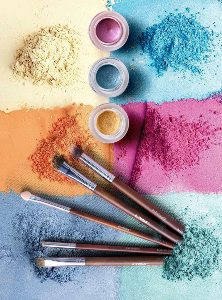The
Impact of Mineral Makeup On Your Health
 |
| Impact of mineral makeup on your health |
Mineral cosmetics are the latest styling mantra. Whether
consumers or brands, none can ignore the rage created by mineral cosmetics.
However, what is strange is the fact that, mineral cosmetics are not
essentially a new concept. A small company made them some years ago and since
then, they attained overnight fame, where suddenly everyone, is all praises for
mineral cosmetics.
Could there be a reason behind this trend, that is the slow
progress of mineral cosmetics, or is it just a matter of chance? Mineral cosmetics
have their own flaws, which are obviously not advertised by the highly
competitive mineral cosmetic market. These flaws are not necessarily common to
all mineral makeup brands and the exact situation varies, with the
manufacturing style. But a deeper insight helps.
Few Ingredients That Could Adversely Affect The Skin
Mineral cosmetics are made from natural elements present in
earth and are therefore, considered to be quite safe for skin. However, there
are various components present in them that could be harmful.
§Titanium Dioxide – An
extremely important component of mineral cosmetics, Titanium Dioxide is found
in majority of mineral cosmetics, irrespective of the brand producing
cosmetics. However, this ingredient is still under scrutiny for its possible
connotation with cancer.
§Mica – Mica is used in mineral cosmetics to help reduce the
appearance of enlarged pores and fine lines. Quiet a famous component, Mica, is
bio-accumulative and is considered toxic to the liver and the gastrointestinal
and respiratory systems. Not to mention, the Cosmetic Industry Review Board has
not scrutinized Mica, which is yet approved by FDA, for usage as a component in
cosmetics.
§Ultramarine Colours – Ultramarine colors are
used to cool down foundations. However, the same are not approved in the United
States for use on lips.
§Silica – Used as an absorbent and oil control product, in mineral
cosmetics, Silica, may be contaminated with small quantities of crystalline
quartz. The crystalline quartz is considered to be carcinogenic and must be
avoided.
Additionally, there are various other ingredients that could
cause irritation or allergy to different skin types.
An analysis of the mentioned simply reflects, the FDA’s casual
regulation policies, towards cosmetics in general and mineral cosmetics in
particular. Many procedures and ingredients, have not been aptly tested by the
Cosmetic Industry Review Board, but are still legal, as have been approved by
FDA. Skin is important and damage to the same is possible, if cosmetics are not
used prior to apt research.
The Colour Compromise – Mineral cosmetics if
considered in their 100% natural form, do not offer many color options. For a
pure mineral cosmetic, the color liking must be sacrificed. However, many
companies add dyes to mineral cosmetics, thus providing, the desired shade
chart. But if dyes are to be used, then why so much propaganda, against regular
cosmetics, which too have dyes in their composition?
The Talc Controversy – Many
believe that talc accentuates wrinkles and not to mention, the same is used in
mineral cosmetics. Technically speaking, talc is Magnesium Silicate Hydroxide.
Various studies conducted over time, have established a link, between talc and
pulmonary tissues, ovarian cancer, and lung, which is even a major concern than
the earlier mentioned wrinkles. Please note here, that no conclusive study has
yet been made, to determine either the toxicity and/or carcinogenic nature of
talc, thus leaving the entire matter in a gray area.
 |
| Mineral makeup |
The Impact – Cosmetics are applied for that
ultimate look and not a smudgy or heavy mask kind of a feel. But many feel that
this is what mineral cosmetics have to offer. There are further complaints,
that mineral products emphasize, upon the fine lines and pores and impart an
even aged look.
The ally of mineral cosmetics however, alleges that it is about
fine application procedures and manufacturing steps. The finer the minerals,
the less shiny they appear. As for the smudgy look, application tips like
dabbing with wet sponge could help.
Despite the debate, mineral cosmetics are gaining in popularity.
Bad as they might sound, the mineral version of makeup is still better than
their counterpart, the regular cosmetics, which are quite harmful?







1 Comments
Informative for us👍
ReplyDeleteFor more information, comment in it